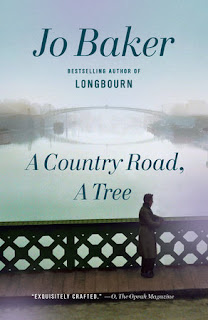
Now here we go with coincidences again. I couldn't have lined it up more perfectly if I had done it on purpose. As I have written previously, I have just this year read Ulysses by James Joyce, what I haven't talked about yet is that just this March I found a good copy of Waiting For Godot by Samuel Beckett at the used book store I visited during Spring Break. This I have also read quite recently. Now my next coincidence is the book A Country Road, A Tree by Jo Baker, the next book on my list of James Tait Black nominees to read.
This book was wonderful! I have been developing a fondness for historical fiction, since I have been reading some very good ones, All That I Am, To Say Nothing of the Dog and The German Girl just to name a few. I did read Baker's Longbourn last year, and enjoyed that. But this one I really enjoyed.
It is a fictional account of Beckett's life just before and during the occupation of France by Nazi Germany. History can be dry and somewhat uninformative of those things that I am interested in the most (the human side of it, thoughts, feelings and motives), which is why I was enthralled with the television drama To Walk Invisible, and A Country Road, A Tree is just as interesting and exciting. There is some name dropping throughout the book, including James Joyce who did live in Paris at the time. Having only read the one play by Beckett, I found myself wanting to read the rest of his works, especially when I reached the part in the novel that was a direct reference to Godot (just imagine what it would have been like if I could have read more of his works before starting this book...my head might have exploded!).
So, in my usual book-geeky way I will come back to this book again sometime after I have read all of Beckett's works, and a biography or two. I love it when a book just inspires you to carry on and read some more (of the author's work and of the subject's).
Next on my list: The Lesser Bohemians by Eimear McBride (and I already have a pretty good idea about the title of that blog entry... something along the lines of What is it with these Irish writers?).



























